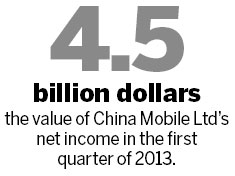Ministry backs out of talks about WeChat
Updated: 2013-04-24 05:31
By He Wei in Shanghai (China Daily)
|
||||||||
|
China Mobile Ltd's stand at a telecom exhibition in Beijing. The company's most recent quarterly profit growth is stagnant for the first time in three years. Da Wei / For China Daily |
The Ministry of Industry and Information Technology said on Tuesday it will not be involved in telecom operators' deliberations over charging for Tencent Holdings Ltd's WeChat mobile messaging application.
The remarks from Zhang Feng, head of the ministry's communications development department, marked a major reversal from the ministry's previous stance of trying to "coordinate" the two parties, analysts said.
Zhang said the decision to charge for Internet and mobile Internet businesses is a market-driven practice, one in which the government does not take sides.
"Since the introduction of WeChat in 2011, the government has not interfered with such services and will uphold this principle," he said.
Zhang said the ministry welcomes and supports the earlier announcement made by Tencent that users will not be charged for its WeChat service.
He added that the ministry supports cooperation between telecom carriers and Internet companies, and will strengthen its supervision of the telecom industry to avoid ill-intentioned competition.
Jiang Jialin, a senior analyst with IT consultancy IDC, attributed the "change of attitude" to mounting public pressure.
"I believe the government does not want to impose policy restrictions on the matter and wishes to rely on the market. Yet it is still undecided whether similar applications will need to be charged," he said.
The announcement comes as China Mobile Ltd's most recent quarterly profit growth was stagnant for the first time in three years, as the world's largest telecom carrier grappled with booming Internet-enabled telecom services and high handset subsidies.
Its net income increased to 27.88 billion yuan ($4.5 billion) in the first quarter of 2013, up only 0.3 percent year-on-year, the company said on Monday.

That contrasted with a moderate revenue surge during the same period, up by 5.7 percent to reach 134.7 billion yuan, as well as a steady growth in subscriber numbers.
The company is quickly transforming its vast but lower-value 2G user base into 3G users, with its 3G client base expanding by 26.4 million from January to March. That almost triples the pace of 3G user development throughout 2012.
Decreased voice services, however, contributed to reduced earnings. The monthly usage of voice services in the first quarter slipped 2.98 percent year-on-year to reach 488 minutes per user each month.
Given that voice business accounted for almost two-thirds of total revenue last year, it weighs heavily on the company's average revenue per user, or ARPU, which registered a rare double-digit dip of 11.3 percent in the first quarter to 63 yuan.
China Mobile, the only Chinese carrier that hasn't clinched a deal with Apple Inc to sell iPhones in the world's biggest mobile market, has applied high subsidies to entice users by signing up contracted phones that work on its indigenous TD-SCDMA 3G network.
Last year, the operator invested 105 billion yuan, up 8.3 percent year-on-year, in customer subsidies and enhanced sales channels. It did not disclose these figures in its latest quarterly release.
The operator identified an"increased mobile penetration rate" and "more apparent substitution of traditional communication business by new technologies and new businesses" as its major headaches.
"It's a bit paradoxical that China Mobile relies much more on traditional voice businesses than its telecom rivals. But, meanwhile, it is much more anxious than its counterparts to develop a 4G network to cash in on data services," said Zeng Tao, telecom analyst of Horizon Research Consultancy Group, on his micro blog.
According to IDC's Jiang, the popularity of data-enabled services reflects the evolving way people communicate, and these services just happen to meet such demands.
He cited a recent IDC study of the US market that showed respondents preferred the likes of WhatsApp and Facebook because they manage to deliver more vivid content and cater to fragmented time.
"So people are not just looking at the reduced fees they need to pay. They are eyeing the more diversified ways they may chat and socialize," Jiang said.
He said it is urgent for telecom carriers to find other revenue streams, such as wireless data traffic and services, to bolster their profit rebound.
"An increasingly prevalent concept in Europe is 'rich communication', in which carriers sell traditional voice and text services in a combo together with video call services," he noted.
hewei@chinadaily.com.cn
(China Daily 04/24/2013 page16)

 Children gathered together as healing process begins
Children gathered together as healing process begins
 Fears surface after hippo kills tourist from Shanghai
Fears surface after hippo kills tourist from Shanghai
 Rescuers win people’s hearts
Rescuers win people’s hearts
 Law to curb tourism price hikes
Law to curb tourism price hikes
 House damaged, life continues in Sichuan
House damaged, life continues in Sichuan
 Relief reaches isolated village
Relief reaches isolated village
 Rainfall poses new threats to quake-hit region
Rainfall poses new threats to quake-hit region
 Funerals begin for Boston bombing victims
Funerals begin for Boston bombing victims
Most Viewed
Editor's Picks

|

|

|

|

|

|
Today's Top News
Industry faces recovery fight
China's 2nd aircraft carrier will be 'larger'
China thanks countries
for quake relief aid
China, US to enhance mutual trust
Beijing protests Diaoyu incident
Copyrights take a bite out of Apple
Four new H7N9 cases
Landslide kills 9 in SW China
US Weekly

|

|







